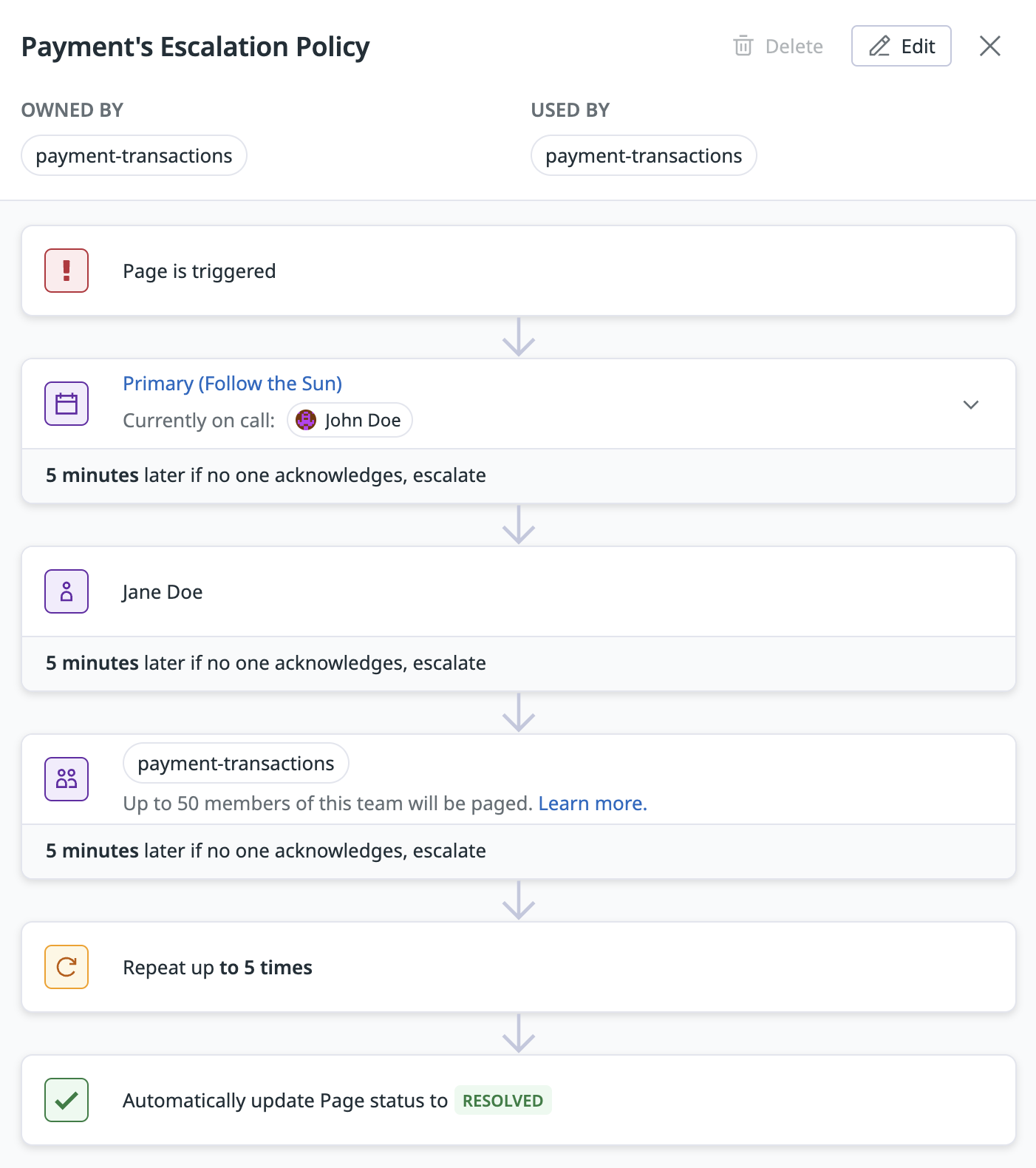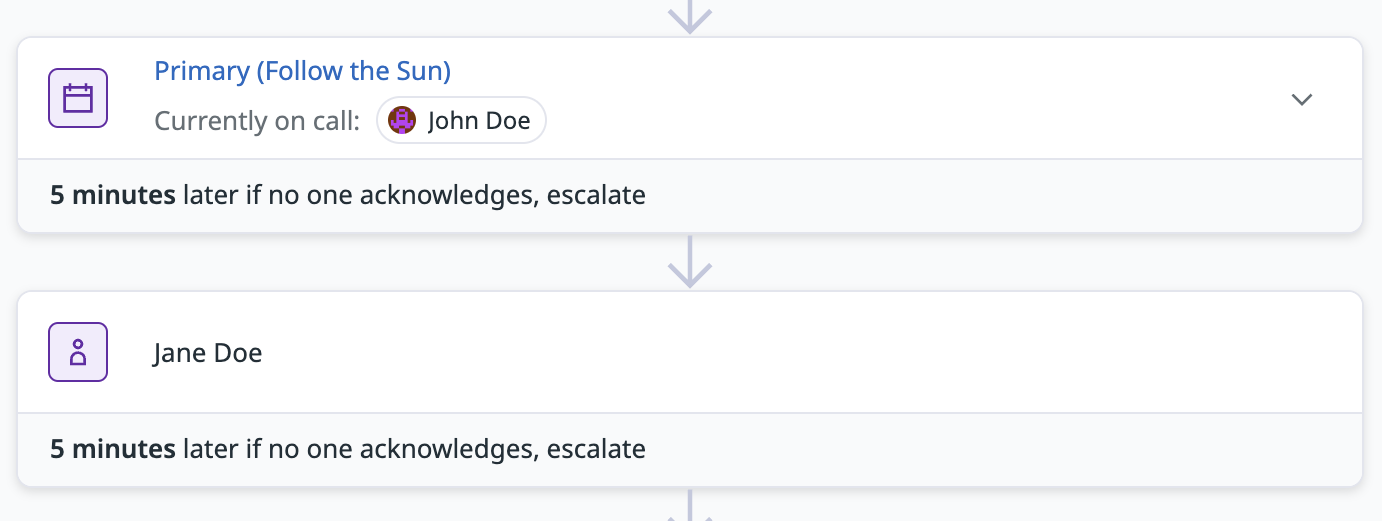- 重要な情報
- はじめに
- 用語集
- Standard Attributes
- ガイド
- インテグレーション
- エージェント
- OpenTelemetry
- 開発者
- Administrator's Guide
- API
- Partners
- DDSQL Reference
- モバイルアプリケーション
- CoScreen
- CoTerm
- Remote Configuration
- Cloudcraft
- アプリ内
- ダッシュボード
- ノートブック
- DDSQL Editor
- Reference Tables
- Sheets
- Watchdog
- アラート設定
- メトリクス
- Bits AI
- Internal Developer Portal
- Error Tracking
- Change Tracking
- Service Management
- Actions & Remediations
- インフラストラクチャー
- Cloudcraft
- Resource Catalog
- ユニバーサル サービス モニタリング
- Hosts
- コンテナ
- Processes
- サーバーレス
- ネットワークモニタリング
- Cloud Cost
- アプリケーションパフォーマンス
- APM
- Continuous Profiler
- データベース モニタリング
- Data Streams Monitoring
- Data Jobs Monitoring
- Data Observability
- Digital Experience
- RUM & セッションリプレイ
- Synthetic モニタリング
- Continuous Testing
- Product Analytics
- Software Delivery
- CI Visibility (CI/CDの可視化)
- CD Visibility
- Deployment Gates
- Test Visibility
- Code Coverage
- Quality Gates
- DORA Metrics
- Feature Flags
- セキュリティ
- セキュリティの概要
- Cloud SIEM
- Code Security
- クラウド セキュリティ マネジメント
- Application Security Management
- Workload Protection
- Sensitive Data Scanner
- AI Observability
- ログ管理
- Observability Pipelines(観測データの制御)
- ログ管理
- CloudPrem
- 管理
エスカレーション ポリシー
This product is not supported for your selected Datadog site. ().
Datadog On-Call では、エスカレーション ポリシーによって Page への対応が迅速に行われるようになります。Page は、所定の時間内に acknowledge されない場合、あらかじめ定義された手順に従って段階的にエスカレーションされます。
Datadog は、Team を On-Call にオンボードする と、デフォルトのエスカレーション ポリシーを作成します。
新しいエスカレーション ポリシーを作成する
- On-Call > Escalation Policies に移動します。
- + New Escalation Policy を選択します。
- エスカレーション ポリシーの Name を入力します。例: Payment’s Escalation Policy。
- このエスカレーション ポリシーを管理する Teams を選択します。
- 各エスカレーション ステップについて、次を設定します:
1. 誰に通知するかを決めます。個別のユーザー、チーム、または schedule で on-call になっている担当者を指定できます。
1. 次の通知方法のいずれかを選択します:
Notify All、Round Robin。詳細は エスカレーション ポリシーの通知タイプ を参照してください。 1. 受信者が Page を acknowledge できる猶予時間 (分) を指定します。期限内に acknowledge されない場合、次の段階へエスカレーションされます。 たとえば次の設定では、Page の発生時に現在 on-call のユーザーへ通知し、John が 5 分以内に acknowledge しなかった場合は Jane Doe へエスカレーションします。 - 誰も Page を acknowledge しない場合に、ステップを何回繰り返すかを設定します。
- すべてのルールと繰り返しを実行した後に、Datadog が Page のステータスを自動的に Resolved に更新するかどうかを選択します。
エスカレーション ポリシーの通知タイプ
エスカレーション ポリシーの各ステップでは、標準の Notify All を使用するか、Round Robin を選択できます。
Notify all (デフォルト)
ステップで指定したすべての通知先へ、同時に通知します。
たとえば、あるステップに「個別ユーザー 1 名」「3 名のメンバーがいるチーム」「schedule」の 3 つが含まれる場合、合計 5 名に通知されます (個別ユーザー 1 名 + チーム メンバー 3 名 + schedule の on-call ユーザー 1 名)。
Round robin
複数の通知先 (ユーザー、schedule、チーム) に対して、ローテーション順に Page を自動的に割り当て、負荷が公平に分散されるようにします。
たとえば 50 人のサポート チームがある場合、10 人ずつの schedule を 5 つに分け、次のようなポリシーを設定すると負荷を均等に分散できます:
- Page A → Support Schedule Group 1
- Page B → Support Schedule Group 2
- Page C → Support Schedule Group 3
- Page D → Support Schedule Group 4
- Page E → Support Schedule Group 5
- Page F → Support Schedule Group 1
- Page G → Support Schedule Group 2
エスカレーションの動作
round robin モードでは、Page が期限内に acknowledge されなかったとしても、round robin の次の人には回りません。その代わり、ポリシー内の次のステップへエスカレーションされます。
Page を round robin 内で次の通知先へ回したい場合は、エスカレーション ポリシー内に round robin のステップを 1 つだけ置き、通知先の数以上の回数だけ繰り返すように構成してください。
エスカレーション ポリシーのステップ通知先
エスカレーション ポリシーの各ステップでは、個別ユーザー、チーム全体、または schedule の on-call 担当者に通知できます。
Schedule
エスカレーション ポリシーは、あらかじめ定義された schedule に従って on-call の担当者へ通知できます。システムが schedule を確認し、インシデント発生時点で実際に on-call になっている個人またはグループへ通知します。schedule を使用すると、次の点で有用です:
- 24 時間 365 日の体制を確保するために、異なるタイム ゾーンの on-call 対応者へアラートを振り分ける。
- 段階的なサポート体制 (シフトごとに緊急度の異なる対応レベルを扱う) を運用する。
- on-call 担当がローテーションするチームで、常に適切な担当者へ動的に通知する (いつでも正しい人が Page される)。
対象の schedule で誰も on-call になっていない場合、そのエスカレーション ステップは自然にスキップされ、遅延や中断なく次の処理へ進みます。UI にはスキップされたエスカレーションが表示されます。
ユーザー
エスカレーション ポリシーに特定のユーザーを含めることで、Page 発生時に重要な担当者へ必ず通知できます。ユーザーへ直接 Page する代表的なユース ケースは次のとおりです:
- 専門知識が必要な高重大度インシデントで、シニア エンジニアへ通知する。
- 顧客影響のあるインシデントに備えて、プロダクト マネージャーやディレクターへ通知する。
- 主担当が不在の場合に備えて、バックアップ 対応者へアラートをルーティングする。
Team
Team 全体に Page する代表的なユース ケースは次のとおりです:
- 複数システムに影響するインシデントで、複数のメンバーが解決に関与し得る場合。
- インフラ関連のインシデントで、DevOps チームへエスカレーションする場合。
- 重大な障害に備えて、エンジニアリング チームやセキュリティ チームの関係者全員へ確実に通知する場合。
制限事項
- エスカレーション ステップの最大数: 10
- 1 つのエスカレーション ステップあたりの通知先 (個人、チーム、schedule) の最大数: 10
- 次のステップへエスカレーションするまでの最短時間: 1 分







